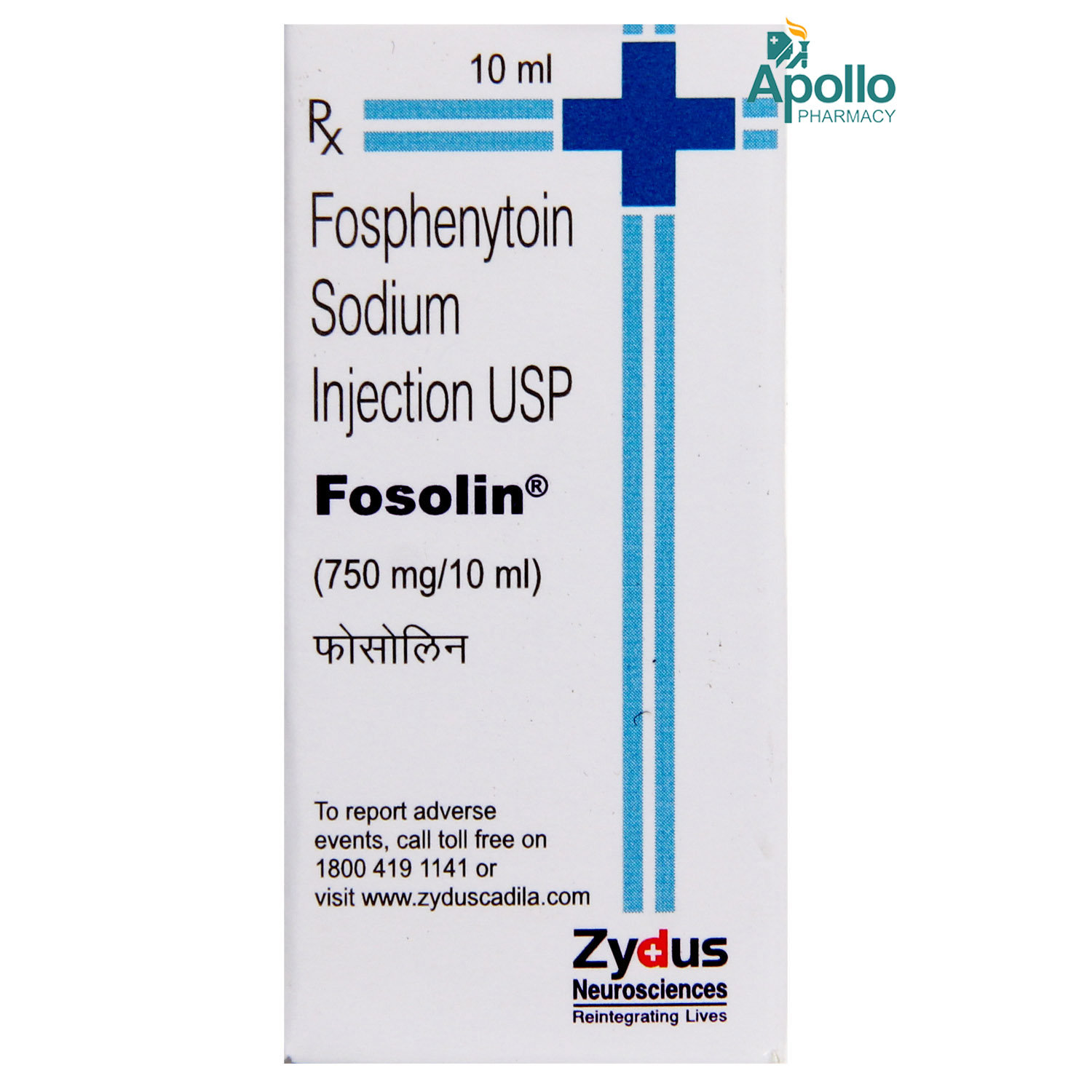Fosphenytoin Sodium
About Fosphenytoin Sodium
Fosphenytoin Sodium belongs to the class of drugs known as anticonvulsants. It is used to treat generalized tonic-clonic seizures as well as to treat and prevent seizures that may occur during or after brain or nervous system operations. A tonic-clonic seizure, often called a grand mal seizure, is characterized by a loss of consciousness and strong muscle contractions. Seizures are uncontrollable bursts of electrical activity in the brain.
Fosphenytoin Sodium contains 'Fosphenytoin Sodium' that decreases the brain's abnormal electrical activity.
A healthcare professional will administer Fosphenytoin Sodium. In some cases, Fosphenytoin Sodium may cause common side effects such as loss of coordination, confusion, dizziness, weakness, dysarthria (slurred speech), dry mouth, headache, vision problems and constipation. Most of these side effects do not require medical attention and will resolve gradually. However, you are advised to talk to your doctor if you experience these side effects persistently.
Before using the Fosphenytoin Sodium, inform your doctor about your medical conditions, sensitivities, and all the ongoing medications. Continue using Fosphenytoin Sodium for as long as your doctor has prescribed. Treatment with Fosphenytoin Sodium should be gradually withdrawn, so do not stop taking Fosphenytoin Sodium without consulting your doctor. Consult your doctor immediately if you observe any behavioural changes or suicidal tendencies. Fosphenytoin Sodium may impair your ability to judge, think clearly, or respond quickly. Do not drive, operate heavy machinery, or engage in risky activities. Avoid consuming alcohol with Fosphenytoin Sodium as it could increase drowsiness and dizziness. Breastfeeding is not recommended for women receiving fosphenytoin sodium injections. It is recommended not to use while pregnant, so inform your doctor if you are pregnant or expect pregnancy.
Uses of Fosphenytoin Sodium
Medicinal Benefits
Fosphenytoin Sodium belongs to the group of medicines called anticonvulsants. It is used to treat primary generalized tonic-clonic seizures (A tonic-clonic seizure, previously known as a grand mal seizure, causes a loss of consciousness and violent muscle contractions) and to treat and prevent seizures that may begin during or after surgery to the brain or nervous system. Fosphenytoin injection may also be used to control certain types of seizures in people who cannot take oral phenytoin.
Directions for Use
Storage
Side Effects of Fosphenytoin Sodium
- Loss of coordination
- Abnormal body movements
- Confusion
- Dizziness
- Weakness
- Anxiety or nervous
- Dysarthria (slurred speech)
- Dry mouth
- Headache
- Dysgeusia (changes in your sense of taste)
- Vision problems
- Ringing of the ears or difficulty hearing
- Itching, burning, or tingling sensation
- Uncontrollable eye movements
- Constipation
Drug Warnings
Do not take Fosphenytoin Sodium if you are allergic to any of its contents. Inform your doctor if you have had heart failure, low blood pressure, irregular heart rhythms, or heart block. Do not drive or operate heavy machinery as Fosphenytoin Sodium may impair your ability to drive or operate machinery. Avoid consumption of alcohol as it may cause increased dizziness/drowsiness and affect the concentration of Fosphenytoin in the blood. While receiving the fosphenytoin injection or afterwards, you may encounter acute or life-threatening low blood pressure or abnormal heart rhythms. If you experience any of the symptoms, contact your doctor right away. It is recommended not to be used in pregnant women and nursing mothers. So inform your doctor if you are pregnant or breastfeeding women before receiving this medicine.
Drug Interactions
Drug-Drug Interactions: Fosphenytoin Sodium may have interaction with medicines used to treat psoriasis and psoriatic arthritis (e.g. apremilast), blood thinners (apixaban), anti-cancer medicines (e.g. bosutinib), antihistamine drugs (e.g. cimetidine), anti-HIV drugs (e.g. delavirdine, dolutegravir), anti-fungal medications (e.g. fluconazole), antipsychotic medications (e.g. haloperidol), antirheumatic drug (e.g. leflunomide), and medicines used to treat chronic pain (e.g. methadone).
Drug-Food Interactions: Do not take alcoholic beverages while on Fosphenytoin Sodium therapy.
Drug-Disease Interactions: Fosphenytoin Sodium interacts with various disease conditions, including bone marrow depression/low blood counts, liver disease, kidney disease, abnormal heart rate, heart disease, hypotension, suicidal tendencies, depression, and psychosis.
Drug-Drug Interactions Checker List:
Safety Advice

Alcohol
unsafeYou are recommended to avoid alcohol consumption while taking Fosphenytoin Sodium to prevent unpleasant side effects. It might also affect the concentration of Fosphenytoin Sodium in the blood.

Pregnancy
cautionFosphenytoin Sodium should not be used during pregnancy. So, inform your doctor if you are pregnant or suspect pregnancy. You or your partner must use a reliable form of contraception to prevent pregnancy while taking these medications.

Breast Feeding
cautionAvoid breastfeeding while on treatment with Fosphenytoin Sodium. Please discuss with your doctor if you have any concerns.

Driving
unsafeFosphenytoin Sodium may temporarily cause vision disturbances; therefore, wait until your vision returns to normal before using machinery or driving.

Liver
cautionFosphenytoin Sodium should be used with caution in patients with liver illness. Inform your doctor before receiving the Fosphenytoin Sodium if you have/had a liver illness. Your doctor will prescribe only if the benefits outweigh the risks.

Kidney
cautionFosphenytoin Sodium should be used with caution in patients with kidney illness. Inform your doctor before receiving the Fosphenytoin Sodium if you have/had a kidney illness. Your doctor will prescribe only if the benefits outweigh the risks.

Children
safe if prescribedFosphenytoin Sodium can be given to children if prescribed by the doctor.
Habit Forming
Diet & Lifestyle Advise
- A ketogenic diet (low in carbohydrates and high in fats) is recommended for people with epilepsy. This diet helps utilise fat instead of glucose to generate energy.
- The Atkins diet (high fat and controlled carbohydrates) is recommended for adolescents and adults.
- Rest well, and get plenty of sleep.
- Avoid smoking and alcohol consumption.
- Exercise, meditation and yoga can help lower stress, decrease pain sensitivity and improve coping skills.
- Prepare your living area; small changes may reduce the risk of physical injury during a seizure.
- Install an alarm or emergency device to get assistance during a seizure attack.
- Have a seizure response plan, which helps those around you know what to do.
- Understand what triggers seizures and try reducing or avoiding them.
- Please pay attention to overall health, as it can help reduce seizure activity.
Special Advise
- Consult your doctor immediately if you have suicidal thoughts such as harming or killing yourself.
Patients Concern
Disease/Condition Glossary
Epilepsy/Seizures: Seizures, also known as fits or convulsions, are a single occurrence of abnormal electrical activity in the brain, whereas epilepsy is a chronic neurological disorder characterized by recurrent seizures. The possible causes of epilepsy include traumatic brain injury, scarring on the brain after a brain injury, high fever, stroke, vascular diseases, lack of oxygen to the brain, brain tumours, and genetic disorders. Symptoms include mood changes, anxiousness, nausea, dizziness, weakness, headache, muscle jerking, spasms, loss of balance, teeth clenching, rapid blinking or eye movements, tongue biting, confusion, and loss of consciousness.
Tonic-clonic seizure: A tonic-clonic seizure, previously known as a grand mal seizure, causes a loss of consciousness and violent muscle contractions.
FAQs
Fosphenytoin Sodium contains 'Fosphenytoin Sodium' that decreases the brain's abnormal electrical activity.
One of the most prevalent side effects of Fosphenytoin Sodium is dysarthria (slurred speech). It normally does not require medical attention and resolves on its own. However, if the illness persists or worsens, please seek medical attention.
Fosphenytoin Sodium frequently causes vision difficulties and uncontrollable eye movements. It normally does not require medical care and resolves on its own over time. However, if the issue persists or worsens, consult a doctor.
Fosphenytoin is not recommended for patients who have a history of hypersensitivity to fosphenytoin or its constituents, as well as phenytoin or other hydantoins.






